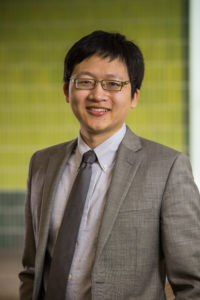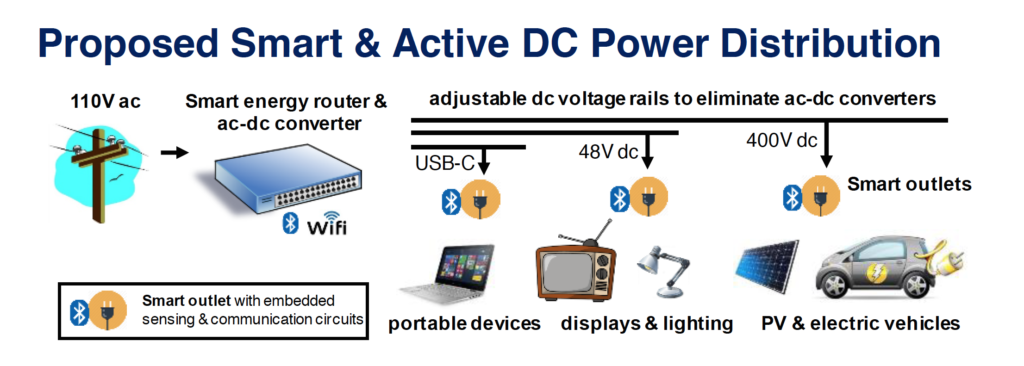 Minjie Chen, an assistant professor jointly appointed in electrical engineering and the Andlinger Center for Energy and the Environment at Princeton University, has been awarded a seed grant to develop a smart energy router for homes and buildings from the Siebel Energy Institute, a global consortium for innovative and collaborative energy research. Chen, who joined the Princeton faculty on February 1, attended an award ceremony and conference on energy grid cybersecurity organized by the institute earlier this month in Washington, D.C.
Minjie Chen, an assistant professor jointly appointed in electrical engineering and the Andlinger Center for Energy and the Environment at Princeton University, has been awarded a seed grant to develop a smart energy router for homes and buildings from the Siebel Energy Institute, a global consortium for innovative and collaborative energy research. Chen, who joined the Princeton faculty on February 1, attended an award ceremony and conference on energy grid cybersecurity organized by the institute earlier this month in Washington, D.C.
Details on the project are below:
Minjie Chen
Assistant Professor of Electrical Engineering and the Andlinger Center for Energy and the Environment
Developing a Smart Energy Router for Flexible and Efficient DC Power Distribution in Smart Homes and Buildings
For historical reasons, most U.S. buildings receive electricity through an alternating current (AC), a form of electricity that periodically reverses direction. Over the years, household appliances and lights, such as incandescent bulbs, used this electricity directly and had no need of a power adapter. But increasingly, current and emerging household appliances – flat-panel displays, computers, and robotic vacuum cleaners – are built to consume power in the form of a direct current (DC), where electricity flows in only one direction. These primarily digital devices usually have bulky adapters to convert AC to DC. The increasing use of solar panels further complicates matters; solar-generated electricity is natively DC, has to be converted to AC for distribution, and then converted back to DC for use. These processes waste energy and indirectly add to the carbon footprint of buildings. Today, energy use in residential and commercial buildings account for more than 40 percent of U.S. electricity consumption and 30 percent of carbon emissions.
Due to the ubiquitous and increasing need for DC power, improving power delivery and energy conversion are critical to increasing building energy efficiency.
Chen’s project aims at developing a smart and flexible DC power delivery architecture to improve energy efficiency in future buildings, reduce emissions, eliminate bulky adapters, and open new opportunities for “smart home” and “smart grid” applications.
 Chen proposes to replace the conventional AC-DC adapters that are attached to electronic appliances with one centralized AC-DC power converter that functions as a smart energy router. It can efficiently integrate solar panels that produce electricity with a multitude of appliances that consume electricity. These appliances connect to the energy router via “smart-outlets,” which are enabled with wireless communication and voltage regulation capabilities. This smart energy router also enables a wide range of smart grid applications, such as demand response – i.e., household appliances turning on and off depending on electricity prices or state of renewable energy generation – and reactive power compensation, which is useful in stabilizing an electric grid with a high level of renewable energy integration.
Chen proposes to replace the conventional AC-DC adapters that are attached to electronic appliances with one centralized AC-DC power converter that functions as a smart energy router. It can efficiently integrate solar panels that produce electricity with a multitude of appliances that consume electricity. These appliances connect to the energy router via “smart-outlets,” which are enabled with wireless communication and voltage regulation capabilities. This smart energy router also enables a wide range of smart grid applications, such as demand response – i.e., household appliances turning on and off depending on electricity prices or state of renewable energy generation – and reactive power compensation, which is useful in stabilizing an electric grid with a high level of renewable energy integration.
Efforts will be devoted to greatly increase the switching frequency of these converters to realize high efficiency, lower energy loss, and high power density.
More about the Andlinger Center for Energy and the Environment
The mission of the Andlinger Center for Energy and the Environment is to develop solutions to ensure our energy and environmental future. To this end, the center supports a vibrant and expanding program of research and teaching in the areas of sustainable energy-technology development, energy efficiency, and environmental protection and remediation. A chief goal of the center is to translate fundamental knowledge into practical solutions that enable sustainable energy production and the protection of the environment and global climate from energy-related anthropogenic change.
For more information on the Andlinger Center for Energy and the Environment, contact Sharon Adarlo, communications specialist, at sadarlo@princeton.edu or (609) 258-9979.